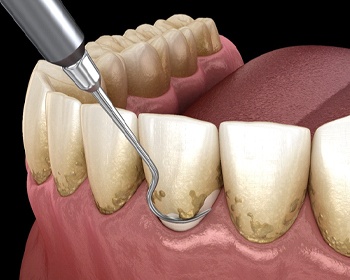Scaling and Root Planing – Worcester, MA
Eliminating Bacteria for Healthier Gums
At Handsman & Haddad Periodontics, P.C., our experts believe in providing safe and effective solutions designed to treat and improve gum health. When bacteria attack soft oral tissues, early detection is key to minimizing worsening oral health conditions. However, should plaque and tartar spread beneath the gum line and cause pockets to form, gum disease treatment in Worcester known as scaling and root planing can be a beneficial way to treat the problem. If you want to learn more about this method of periodontal treatment, contact us today to schedule an appointment.
What is the Difference Between Scaling and Root Planing?

Although scaling and root planing are typically completed during the same appointment, there is a difference between the two treatments. Scaling involves removing plaque and tartar that has accumulated on the surface of your teeth that exists above the gum line. Root planing involves moving beneath the gum line and removing additional plaque and tartar before smoothing the tooth root to encourage proper reattachment.
Why is Scaling and Root Planing Necessary?

While it may not sound like a pleasant procedure, the truth is that not only will you be completely comfortable throughout the process, but it is necessary to ensure your oral and overall health do not suffer more serious complications down the road.
When gum disease is left untreated, it can adversely affect various areas of your body (i.e., brain, heart, lungs, kidneys, etc.). Once inflammation and infection enter the bloodstream, they can travel to various organs and cause problems to occur.
But your body isn’t the only thing that will suffer, gum disease can also cause recession of your soft oral tissues and destruction of your jawbone and teeth. As plaque and tartar spread, gum pockets will form, making it easier for bacteria and food particles to become trapped. Also, the longer you wait to receive treatment, the greater your risk of bacteria damaging your jawbone, causing it to deteriorate and lead to loose teeth that will eventually fall out.
You can also experience a dramatic change in the color of your teeth, as periodontal disease is known to cause aesthetic issues as well as bad breath because of the increased bacteria.
By undergoing scaling and root planing, you can safeguard your smile and body from the negative effects of gum disease. Instead of worrying about redness, inflammation, and bleeding gums, you can instead enjoy a healthier, more vibrant smile.
How Does Scaling & Root Planing Work?

If you suspect you are suffering from symptoms associated with periodontal disease, Dr. Handsman or Dr. Jenny can recommend bleeding gum treatment in Worcester, which includes scaling and root planing. After thoroughly examining your teeth and gum tissues during an initial appointment, we will create a comprehensive treatment plan mapping out how we plan to address the problem and restore your oral health.
On the day of your treatment, we will use specialized instruments to begin removing plaque and tartar from above the gum line (scaling). We will then begin to target the areas beneath the gum line and remove more plaque and tartar before smoothing the tooth root. This process makes it more difficult for bacteria to become trapped and attack your tissues, teeth, and bone.
Apart from the removal of these deposits, scaling and root planing also eradicates any toxins emitted by the bacteria inside your mouth.
Scaling & Root Planing FAQs

Finding out that you have gum disease can be frightening, but we can protect your smile from the worst-case scenario thanks to scaling and root planing. If you have never had this procedure performed before, you may be wondering about the specifics. We encourage you to voice your questions so that our team can answer them in a clear, helpful way. However, before reaching out to us, you may want to check to see if your questions have already been addressed in the FAQs below.
What should not be done after scaling and root planing?
You should avoid eating anything until the numbness in your mouth has worn off. After that, you should stay away from any spicy, acidic, hot, or cold foods while your mouth is still healing. It’s also best to exclude nuts, chips, and other crunchy foods from your diet for the time being.
For at least 24 hours, you should not engage in any vigorous physical exercise; it’s important to rest so that your mouth can heal properly.
What can I expect from scaling and root planing?
Scaling and root planing are quite safe. While there may be discomfort during the treatment, you can rest assured that we will do whatever we can to minimize it. For one thing, a local anesthetic will be used to keep the gums numb while we’re treating them. Some bleeding or swelling might occur after the procedure, but these symptoms will normally go away on their own.
If you notice excessive bleeding after your procedure, or if there is swelling that doesn’t seem to be getting better over time, please let us know immediately.
Do gums grow back after root planing?
Gum recession is a common consequence of gum disease. As such, once you have had root planing performed, you may be wondering whether your receded gum tissue will grow back. Unfortunately, the answer is no; once that tissue is gone, it is gone for good.
That being said, in many cases your gum recession can be reversed with a gum grafting procedure. For this treatment, we take a bit of tissue from the roof of your mouth and transplant it in order to cover the exposed parts of your teeth. We will let you know if we believe that your periodontal treatment should include gum grafting.
How painful is root planing?
As mentioned above, a local anesthetic will be used to keep your gums numb while root planing is being performed. Once the procedure is complete, your gums will feel a bit numb for a few days. We’ll give you aftercare instructions to follow after your root planing procedure to help you keep your discomfort under control and avoid problems during the recovery process. Any discomfort should fade over time; if it persists or grows worse, that’s not normal, and you should call our office immediately to let us know.

